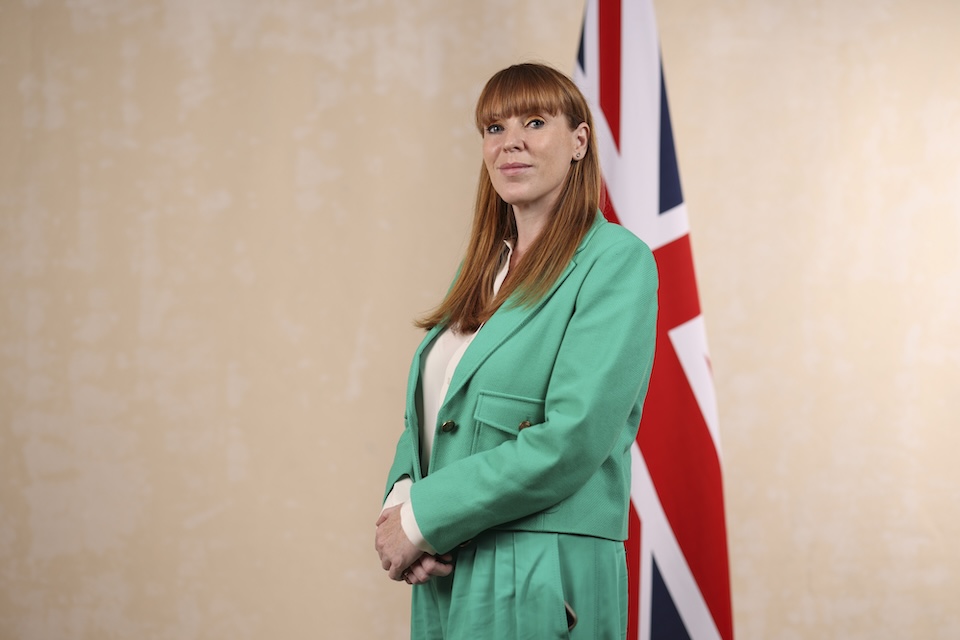Firstly, I want to say a massive thank you to you, some of our most dedicated, brilliant public servants in this room.
For everything that you do, every day, to keep our country going.
You’ve shown remarkable resilience through some tough – and very tough – years.
During the pandemic, you kept vital services running in our communities.
Through this period of economic instability, you’ve made tough choices to protect the most vulnerable.
And following a summer of violent far-right disorder, you stood up for the values of decency and community that define our country.
And time and again, you step forward to support your local communities.
Now, I understand that this conference was originally planned for just before the General Election.
I have to admit that I’m much happier to be stood here as your Deputy Prime Minister!
Last year in Bournemouth, I said that if we were elected, we would deliver a plan for change.
A new way of governing. A government of public service.
And just over 100 days into government and we are getting on with the job.
We’re fixing the foundations to build a country that works for working people.
And local government is at the heart of this vision.
Because as you all know, I am a creature of local government.
I loved my job as a home help for Stockport council.
And I learned the importance of a good local service, and what it meant to really know and trust your community.
Back then, local government wasn’t on its knees.
Don’t get me wrong, things weren’t easy.
But we had the time and resource to provide a good service.
I know that good, functioning local government looks like great working with a good central government working in genuine partnership to deliver better outcomes.
So I know we can’t deliver true change for Britain without the support of every one of you in this room.
We can’t deliver for our missions without you.
Take our plans to deliver 1.5 million homes, including a new generation of secure, social and affordable homes.
The delivery of safer streets, an NHS and social care system that’s back on its feet.
The sustained economic growth we need to raise living standards.
And the strong communities on which good lives are built.
That’s why, in my very first week in the job – as Secretary of State for Housing, Communities and Local Government – I put local government back where it belongs.
At the heart of my department’s name and mission.
And I’m lucky I have Jim by my side, the Minister of State for Local Government – who has run a council and knows local government from the inside out – and he’s here with me today and as part of the team.
Louise, your new Chair, also represents the best of local government – a fierce commitment to public service and leadership steeped in years of experience – not too many years, but a few.
And the fact that her predecessor, Shaun, has now joined us in the House of Commons just goes to show we are a government that believes in the power of local government.
We know what’s possible when you give people with skin in the game the power to change lives.
And, after an incredibly difficult few years, it’s time to unleash that power.
Which means resetting our relationship with local government and rebuilding its foundations.
It means ditching the slogans and gimmicks and going back to basics: delivering services that people can rely on.
You don’t need me to tell you how much harder that job has been after fourteen years of neglect.
[Redacted political content]
Councils stuck in a doom loop with money pouring out of a system with too many cracks.
And it isn’t just the scandal of wasted money. It’s the heartache of the wasted lives and potential.
[Redacted political content]
For all the promises about localism and levelling up, there was an assumption that if something needed doing, it should be done from Whitehall.
With central government hoarding power, micromanaging you, intervening in an uncoordinated and unhelpful way.
A begging-bowl system of wasteful competitive pots that led to councils bidding to pay for chess tables in public parks.
No more.
We’re going to turn the page on this failed approach – bringing local government into the heart of government.
As part of a partnership based on honesty and respect.
And it’s in that spirit that we need to face up to the financial crisis facing local government.
We all know that there’s no quick fix.
The dire public finances – the £22 billion black hole – we’ve inherited mean that it’s going to take hard graft on all sides to get us back on the road to recovery.
We knew things were bad, but on entering office, we uncovered a shocking crisis in local government which was far beyond what we had anticipated.
Councils of all political stripes have been left shelling out millions to plaster over the government’s mismanagement.
[Redacted political content]
To make matters worse, we discovered that over the last decade, the last [Redacted political content] government ripped away any financial oversight of council spending, scrapping the Audit Commission and pushing councils to borrow more and more.
This reckless approach has left the government with no transparent system in place to warn the public when a council is struggling.
And more and more authorities are struggling to stay afloat with communities in the most deprived parts of our country disproportionately affected, through cuts to services that they desperately depend on, as people’s [inaudible] go up.
And get it.
And I know we need change urgently.
You’ve all heard me say it – I’m going provide multi-year funding settlements, that will give you the stability and certainty to plan and invest for the long-term.
And that we will end the Dragon’s Den-style bidding wars between councils for competitive funding pots.
Instead, we’ll show you some respect with long-term funding, giving you flexibility to spend it where it is needed.
And through the next Local Government Finance Settlement and beyond, we will provide more detail on how this is going to work.
Let me be clear that we can’t fix the system overnight.
[Redacted political content]
And I have to say, looking at the numbers we inherited, I am shocked by the scale of neglect.
It is going to be a long, hard slog to get local government back on its feet.
And in the short term, we’re doing all that we can to protect severely struggling councils, which is why I can announce that we are scrapping the punitive ‘pay day loan’ premium on borrowing for councils in need of Exceptional Financial Support.
This government will take a collaborative and a constructive approach to councils in financial difficulty.
You know I can’t go into detail about the Spending Review.
So let me talk to you today about things that I can tell you.
Fundamentally, I want to work together, across central and local government to reform high-cost public services and focus on preventing people from needing them in the first place.
Tackling profiteering in broken markets serving vulnerable groups, like we’ve seen in some of the private children’s homes.
When it comes to prevention, there can be few bigger priorities for us than preventing homelessness – one of the biggest pressures that you face.
By getting Britain building again. Speeding up the planning system and reintroducing mandatory housing targets.
I know that this will mean asking more from local councils.
Which is why we’re boosting the number of planners.
As part of our plans, to strengthen local planning departments and reinforce planning obligations to deliver more affordable homes on new developments – we will support you to hold developers to account.
And it’s why we’re also reviewing Right to Buy, to stem the loss of precious council homes.
But we’ll also tackle homelessness directly, by learning lessons from the past and working with local leaders to take action on all forms of homelessness.
We will develop a cross-government strategy to get us back on track to end homelessness.
We will also reform the broken local audit system in England that we inherited.
This should be the bedrock of local accountability and transparency, of trust and confidence in local democracy.
Instead, last year, just one percent of local bodies were able to publish audited accounts by the deadline.
This cannot go on.
We have already taken decisive action to introduce backstop dates to clear the backlog in unaudited accounts.
Local audit will and must provide value for money for the taxpayers and be fit for the future.
And similarly, when the way councils are run has gone wrong, central government hasn’t always responded constructively.
Instead kicking councils when they’re down for political reasons.
This Labour government are going to do things differently.
We will work with every council that needs it to put in place clear, deliverable plans to address problems and protect local taxpayers, rather than treating them as political footballs.
That’s the approach we’re taking in Birmingham.
Significant challenges continue to face the city council, but we’re going to work with the councillors and the community to solve them in partnership.
Birmingham has huge potential – and we’re going to work closely with the partners across the West Midlands to unlock that potential, including with the Mayor Parker of the West Midlands Combined Authority.
And that’s the change that we represent.
Not punishment, but collaboration.
Getting places into a stable financial footing by, yes, making difficult decisions, but with the interests of residents at the heart.
Our aim is to support councils to perform at their very best.
Councillor conduct / standards framework
Standards in local government matter – both the delivery of services and personal conduct.
Every decision you make has an impact on the daily lives of those you serve.
And most councillors meet the highest standards of public office and I am so proud to be representing you in government.
But sadly we all know there are rare occasions where bad behaviour occurs.
I’ve been made aware of cases of persistent bullying and harassment by councillors, even, in some cases, leading to victims’ resignations.
We don’t have a system that protects victims or empowers councils to deal with unacceptable behaviour.
And this cannot go on and we will give councils the powers to address poor conduct.
We will consult on reforms to the local government standards framework, including a proposal to allow for the suspension of members who violate codes of conduct.
But we also recognise that too often, councillors become victims themselves.
Too often I speak to dedicated councillors who are facing death threats and intimidation.
And I take this very seriously and recognise the impact this has on the lives of dedicated public servants and their families.
That’s why we are taking decisive action to prevent councillors from being subjected to intimidation and harassment by removing the requirement for members’ home addresses to be published.
[And I want you to know] this is a government that respects and appreciates the huge contribution made by councillors who work tirelessly for residents – and we will always have your back.
We are also taking a more collaborative approach to pressing issues like the widespread workforce challenges you are experiencing.
Ninety-four per cent of councils say they’re having difficulties with recruitment and retention.
This isn’t just your problem – it’s all our problem because council staff are on the frontline serving local communities.
So, we’re ready to work hand in hand with you to find creative solutions to staffing issues.
We’ll launch a Workforce Development Group in partnership with the sector to gain a shared understanding of the most immediate priorities and focus our efforts on where we can add the most value to your work.
And when we say we’ll work in partnership with the sector, every step of the way, we mean it.
I have formally launched our new Leaders’ Council at this very conference – which will give local government a voice at the heart of government – this a mark of just how seriously we take this.
The Council will bring together local government leaders and ministers to tackle shared problems and deliver for the communities they all ultimately serve.
We will use it to learn from the exciting innovations that councils are pioneering.
And we hugely respect your knowledge and expertise.
But it’s more than that.
The Leaders’ Council will be critical for co-designing policy at the highest levels.
And I look forward to working closely with the Council over the coming years.
Gone are the day of diktats from above.
It is time for those with skin in the game to be put in the driving seat.
That is what our devolution agenda is all about.
We will make it easier for you to come together and form combined authorities and devolve more powers to existing ones – meaning access to new powers over skills, transport and employment support.
Our landmark English Devolution Bill will deliver our manifesto commitment to transfer power out of Whitehall, making devolution the default setting.
And look, I know the coming years won’t always be easy, but I’m confident that, working in partnership, we can fix the basics so that you can focus on the things that really matter to our and your communities.
My starting point is that we should be clear about what we ask of you and then give you the autonomy and the support you need to deliver.
So, where we don’t need to get involved, we won’t.
It’s not our place, for example, to decide whether councillors should attend your meetings remotely or use proxy votes when they need to.
So, I can announce today that we’re putting forward proposals to let councils make the decision for themselves.
Which means making it possible for people from all walks of life to have a stake in local democracy, whether they have caring responsibilities or aren’t able to make it to the town hall in person because of illness or disability.
It’s right that we make it easier for more people to get involved in making their community a great place to live.
It’s also right that we expect the highest standards of local government – with central government playing its part as a responsible steward.
And for me this is personal.
I’m passionate about backing you with the long-term funding and certainty that you need.
The powers you need.
And the new relationship that we all need.
So local government can once again be a strong, functioning arm of the state, providing public services that people can rely on.
And I want to thank you, once again, for everything that you do for our communities.
This is a government of service that is on your side.
And the road ahead won’t always be a smooth path, but we will walk it together and build a better Britain.
Thank you.










